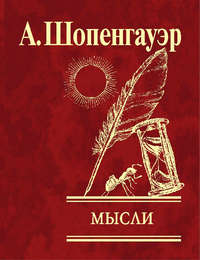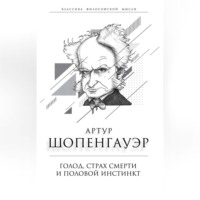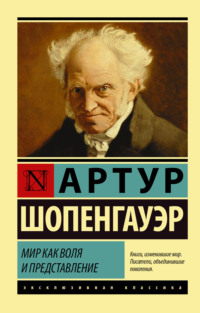 полная версия
полная версияThe World as Will and Idea (Vol. 3 of 3)
The considerations concerning genius here set forth are connected by way of supplement with the exposition contained in chapter 21, of the ever wider separation of the will and the intellect, which can be traced in the whole series of existences. This reaches its highest grade in genius, where it extends to the entire liberation of the intellect from its root the will, so that here the intellect becomes perfectly free, whereby the world as idea first attains to complete objectification.
A few remarks now concerning the individuality of genius. Aristotle has already said, according to Cicero (Tusc., i. 33), “Omnes ingeniosos melancholicos esse;” which without doubt is connected with the passage of Aristotle's “Problemata,” xxx. 1. Goethe also says: “My poetic rapture was very small, so long as I only encountered good; but it burnt with a bright flame when I fled from threatening evil. The tender poem, like the rainbow, is only drawn on a dark ground; hence the genius of the poet loves the element of melancholy.”
This is to be explained from the fact that since the will constantly re-establishes its original sway over the intellect, the latter more easily withdraws from this under unfavourable personal relations; because it gladly turns from adverse circumstances, in order to a certain extent to divert itself, and now directs itself with so much the greater energy to the foreign external world, thus more easily becomes purely objective. Favourable personal relations act conversely. Yet as a whole and in general the melancholy which accompanies genius depends upon the fact that the brighter the intellect which enlightens the will to live, the more distinctly does it perceive the misery of its condition. The melancholy disposition of highly gifted minds which has so often been observed has its emblem in Mont Blanc, the summit of which is for the most part lost in clouds; but when sometimes, especially in the early morning, the veil of clouds is rent and now the mountain looks down on Chamounix from its height in the heavens above the clouds, then it is a sight at which the heart of each of us swells from its profoundest depths. So also the genius, for the most part melancholy, shows at times that peculiar serenity already described above, which is possible only for it, and springs from the most perfect objectivity of the mind. It floats like a ray of light upon his lofty brow: In tristitia hilaris, in hilaritate tristis.
All bunglers are so ultimately because their intellect, still too firmly bound to the will, only becomes active when spurred on by it, and therefore remains entirely in its service. They are accordingly only capable of personal aims. In conformity with these they produce bad pictures, insipid poems, shallow, absurd, and very often dishonest philosophemes, when it is to their interest to recommend themselves to high authorities by a pious disingenuousness. Thus all their action and thought is personal. Therefore they succeed at most in appropriating what is external, accidental, and arbitrary in the genuine works of others as mannerisms, in doing which they take the shell instead of the kernel, and yet imagine they have attained to everything, nay, have surpassed those works. If, however, the failure is patent, yet many hope to attain success in the end through their good intentions. But it is just this good will which makes success impossible; because this only pursues personal ends, and with these neither art nor poetry nor philosophy can ever be taken seriously. Therefore the saying is peculiarly applicable to such persons: “They stand in their own light.” They have no idea that it is only the intellect delivered from the government of the will and all its projects, and therefore freely active, that makes one capable of genuine productions, because it alone imparts true seriousness; and it is well for them that they have not, otherwise they would leap into the water. The good will is in morality everything; but in art it is nothing. In art, as the word itself indicates (Kunst), what alone is of consequence is ability (Können). It all amounts ultimately to this, where the true seriousness of the man lies. In almost all it lies exclusively in their own well-being and that of their families; therefore they are in a position to promote this and nothing else; for no purpose, no voluntary and intentional effort, imparts the true, profound, and proper seriousness, or makes up for it, or more correctly, takes its place. For it always remains where nature has placed it; and without it everything is only half performed. Therefore, for the same reason, persons of genius often manage so badly for their own welfare. As a leaden weight always brings a body back to the position which its centre of gravity thereby determined demands, so the true seriousness of the man always draws the strength and attention of the intellect back to that in which it lies; everything else the man does without true seriousness. Therefore only the exceedingly rare and abnormal men whose true seriousness does not lie in the personal and practical, but in the objective and theoretical, are in a position to apprehend what is essential in the things of the world, thus the highest truths, and reproduce them in any way. For such a seriousness of the individual, falling outside himself in the objective, is something foreign to the nature of man, something unnatural, or really supernatural: yet on account of this alone is the man great; and therefore what he achieves is then ascribed to a genius different from himself, which takes possession of him. To such a man his painting, poetry, or thinking is an end; to others it is a means. The latter thereby seek their own things, and, as a rule, they know how to further them, for they flatter their contemporaries, ready to serve their wants and humours; therefore for the most part they live in happy circumstances; the former often in very miserable circumstances. For he sacrifices his personal welfare to his objective end; he cannot indeed do otherwise, because his seriousness lies there. They act conversely; therefore they are small, but he is great. Accordingly his work is for all time, but the recognition of it generally only begins with posterity: they live and die with their time. In general he only is great who in his work, whether it is practical or theoretical, seeks not his own concerns, but pursues an objective end alone; he is so, however, even when in the practical sphere this end is a misunderstood one, and even if in consequence of this it should be a crime. That he seeks not himself and his own concerns, this makes him under all circumstances great. Small, on the other hand, is all action which is directed to personal ends; for whoever is thereby set in activity knows and finds himself only in his own transient and insignificant person. He who is great, again, finds himself in all, and therefore in the whole: he lives not, like others, only in the microcosm, but still more in the macrocosm. Hence the whole interests him, and he seeks to comprehend it in order to represent it, or to explain it, or to act practically upon it. For it is not strange to him; he feels that it concerns him. On account of this extension of his sphere he is called great. Therefore that lofty predicate belongs only to the true hero, in some sense, and to genius: it signifies that they, contrary to human nature, have not sought their own things, have not lived for themselves, but for all. As now clearly the great majority must constantly be small, and can never become great, the converse of this, that one should be great throughout, that is, constantly and every moment, is yet not possible —
“For man is made of common clay,
And custom is his nurse.”
Every great man must often be only the individual, have only himself in view, and that means he must be small. Upon this depends the very true remark, that no man is a hero to his valet, and not upon the fact that the valet cannot appreciate the hero; which Goethe, in the “Wahlverwandhschaften” (vol. ii. chap. 5), serves up as an idea of Ottilie's.
Genius is its own reward: for the best that one is, one must necessarily be for oneself. “Whoever is born with a talent, to a talent, finds in this his fairest existence,” says Goethe. When we look back at a great man of former times, we do not think, “How happy is he to be still admired by all of us!” but, “How happy must he have been in the immediate enjoyment of a mind at the surviving traces of which centuries revive themselves!” Not in the fame, but in that whereby it is attained, lies the value, and in the production of immortal children the pleasure. Therefore those who seek to show the vanity of posthumous fame from the fact that he who obtains it knows nothing of it, may be compared to the wiseacre who very learnedly tried to demonstrate to the man who cast envious glances at a heap of oyster-shells in his neighbour's yard the absolute uselessness of them.
According to the exposition of the nature of genius which has been given, it is so far contrary to nature, inasmuch as it consists in this, that the intellect, whose real destination is the service of the will, emancipates itself from this service in order to be active on its own account. Accordingly genius is an intellect which has become untrue to its destination. Upon this depend the disadvantages connected with it, for the consideration of which we shall now prepare the way by comparing genius with the less decided predominance of the intellect.
The intellect of the normal man, strictly bound to the service of the will, and therefore really only occupied with the apprehension of motives, may be regarded as a complex system of wires, by means of which each of these puppets is set in motion in the theatre of the world. From this arises the dry, grave seriousness of most people, which is only surpassed by that of the brutes, who never laugh. On the other hand, we might compare the genius, with his unfettered intellect, to a living man playing along with the large puppets of the famous puppet-show at Milan, who would be the only one among them who would understand everything, and would therefore gladly leave the stage for a while to enjoy the play from the boxes; – that is the reflectiveness of genius. But even the man of great understanding and reason, whom one might almost call wise, is very different from the genius, and in this way, that his intellect retains a practical tendency, is concerned with the choice of the best ends and means, therefore remains in the service of the will, and accordingly is occupied in a manner that is thoroughly in keeping with nature. The firm, practical seriousness of life which the Romans denoted gravitas presupposes that the intellect does not forsake the service of the will in order to wander away after that which does not concern the will; therefore it does not admit of that separation of the will and the intellect which is the condition of genius. The able, nay, eminent man, who is fitted for great achievements in the practical sphere, is so precisely because objects rouse his will in a lively manner, and spur him on to the ceaseless investigation of their relations and connections. Thus his intellect has grown up closely connected with his will. Before the man of genius, on the contrary, there floats in his objective comprehension the phenomenon of the world, as something foreign to him, an object of contemplation, which expels his will from consciousness. Round this point turns the distinction between the capacity for deeds and for works. The latter demand objectivity and depth of knowledge, which presupposes entire separation of the intellect from the will; the former, on the other hand, demands the application of knowledge, presence of mind, and decision, which required that the intellect should uninterruptedly attend to the service of the will. Where the bond between the intellect and the will is loosened, the intellect, turned away from its natural destination, will neglect the service of the will; it will, for example, even in the need of the moment, preserve its emancipation, and perhaps be unable to avoid taking in the picturesque impression of the surroundings, from which danger threatens the individual. The intellect of the reasonable and understanding man, on the other hand, is constantly at its post, is directed to the circumstances and their requirements. Such a man will therefore in all cases determine and carry out what is suitable to the case, and consequently will by no means fall into those eccentricities, personal slips, nay, follies, to which the genius is exposed, because his intellect does not remain exclusively the guide and guardian of his will, but sometimes more, sometimes less, is laid claim to by the purely objective. In the contrast of Tasso and Antonio, Goethe has illustrated the opposition, here explained in the abstract, in which these two entirely different kinds of capacity stand to each other. The kinship of genius and madness, so often observed, depends chiefly upon that separation of the intellect from the will which is essential to genius, but is yet contrary to nature. But this separation itself is by no means to be attributed to the fact that genius is accompanied by less intensity of will; for it is rather distinguished by a vehement and passionate character; but it is to be explained from this, that the practically excellent person, the man of deeds, has merely the whole, full measure of intellect required for an energetic will while most men lack even this; but genius consists in a completely abnormal, actual superfluity of intellect, such as is required for the service of no will. On this account the men of genuine works are a thousand times rarer than the men of deeds. It is just that abnormal superfluity of intellect by virtue of which it obtains the decided preponderance, sets itself free from the will, and now, forgetting its origin, is freely active from its own strength and elasticity; and from this the creations of genius proceed.
Now further, just this, that genius in working consists of the free intellect, i. e., of the intellect emancipated from the service of the will, has as a consequence that its productions serve no useful ends. The work of genius is music, or philosophy, or paintings, or poetry; it is nothing to use. To be of no use belongs to the character of the works of genius; it is their patent of nobility. All other works of men are for the maintenance or easing of our existence; only those we are speaking of are not; they alone exist for their own sake, and are in this sense to be regarded as the flower or the net profit of existence. Therefore our heart swells at the enjoyment of them, for we rise out of the heavy earthly atmosphere of want. Analogous to this, we see the beautiful, even apart from these, rarely combined with the useful. Lofty and beautiful trees bear no fruit; the fruit-trees are small, ugly cripples. The full garden rose is not fruitful, but the small, wild, almost scentless roses are. The most beautiful buildings are not the useful ones; a temple is no dwelling-house. A man of high, rare mental endowments compelled to apply himself to a merely useful business, for which the most ordinary man would be fitted, is like a costly vase decorated with the most beautiful painting which is used as a kitchen pot; and to compare useful people with men of genius is like comparing building-stone with diamonds.
Thus the merely practical man uses his intellect for that for which nature destined it, the comprehension of the relations of things, partly to each other, partly to the will of the knowing individual. The genius, on the other hand, uses it, contrary to its destination, for the comprehension of the objective nature of things. His mind, therefore, belongs not to himself, but to the world, to the illumination of which, in some sense, it will contribute. From this must spring manifold disadvantages to the individual favoured with genius. For his intellect will in general show those faults which are rarely wanting in any tool which is used for that for which it has not been made. First of all, it will be, as it were, the servant of two masters, for on every opportunity it frees itself from the service to which it was destined in order to follow its own ends, whereby it often leaves the will very inopportunely in a fix, and thus the individual so gifted becomes more or less useless for life, nay, in his conduct sometimes reminds us of madness. Then, on account of its highly developed power of knowledge, it will see in things more the universal than the particular; while the service of the will principally requires the knowledge of the particular. But, again, when, as opportunity offers, that whole abnormally heightened power of knowledge directs itself with all its energy to the circumstances and miseries of the will, it will be apt to apprehend these too vividly, to behold all in too glaring colours, in too bright a light, and in a fearfully exaggerated form, whereby the individual falls into mere extremes. The following may serve to explain this more accurately. All great theoretical achievements, in whatever sphere they may be, are brought about in this way: Their author directs all the forces of his mind upon one point, in which he lets them unite and concentrate so strongly, firmly, and exclusively that now the whole of the rest of the world vanishes for him, and his object fills all reality. Now this great and powerful concentration which belongs to the privileges of genius sometimes appears for it also in the case of objects of the real world and the events of daily life, which then, brought under such a focus, are magnified to such a monstrous extent that they appear like the flea, which under the solar microscope assumes the stature of an elephant. Hence it arises that highly gifted individuals sometimes are thrown by trifles into violent emotions of the most various kinds, which are incomprehensible to others, who see them transported with grief, joy, care, fear, anger, &c., by things which leave the every-day man quite composed. Thus, then, the genius lacks soberness, which simply consists in this, that one sees in things nothing more than actually belongs to them, especially with reference to our possible ends; therefore no sober-minded man can be a genius. With the disadvantages which have been enumerated there is also associated hyper-sensibility, which an abnormally developed nervous and cerebral system brings with it, and indeed in union with the vehemence and passionateness of will which is certainly characteristic of genius, and which exhibits itself physically as energy of the pulsation of the heart. From all this very easily arises that extravagance of disposition, that vehemence of the emotions, that quick change of mood under prevailing melancholy, which Goethe has presented to us in Tasso. What reasonableness, quiet composure, finished surveyal, certainty and proportionateness of behaviour is shown by the well-endowed normal man in comparison with the now dreamy absentness, and now passionate excitement of the man of genius, whose inward pain is the mother's lap of immortal works! To all this must still be added that genius lives essentially alone. It is too rare to find its like with ease, and too different from the rest of men to be their companion. With them it is the will, with him it is knowledge, that predominates; therefore their pleasures are not his, and his are not theirs. They are merely moral beings, and have merely personal relations; he is at the same time a pure intellect, and as such belongs to the whole of humanity. The course of thought of the intellect which is detached from its mother soil, the will, and only returns to it periodically, will soon show itself entirely different from that of the normal intellect, still cleaving to its stem. For this reason, and also on account of the dissimilarity of the pace, the former is not adapted for thinking in common, i. e., for conversation with the others: they will have as little pleasure in him and his oppressive superiority as he will in them. They will therefore feel more comfortable with their equals, and he will prefer the entertainment of his equals, although, as a rule, this is only possible through the works they have left behind them. Therefore Chamfort says very rightly: “Il y a peu de vices qui empêchent un homme d'avoir beaucoup d'amis, autant que peuvent le faire de trop grandes qualités.” The happiest lot that can fall to the genius is release from action, which is not his element, and leisure for production. From all this it results that although genius may highly bless him who is gifted with it, in the hours in which, abandoned to it, he revels unhindered in its delight, yet it is by no means fitted to procure for him a happy course of life; rather the contrary. This is also confirmed by the experience recorded in biographies. Besides this there is also an external incongruity, for the genius, in his efforts and achievements themselves, is for the most part in contradiction and conflict with his age. Mere men of talent come always at the right time; for as they are roused by the spirit of their age, and called forth by its needs, they are also capable only of satisfying these. They therefore go hand in hand with the advancing culture of their contemporaries or with the gradual progress of a special science: for this they reap reward and approval. But to the next generation their works are no longer enjoyable; they must be replaced by others, which again are not permanent. The genius, on the contrary, comes into his age like a comet into the paths of the planets, to whose well-regulated and comprehensible order its entirely eccentric course is foreign. Accordingly he cannot go hand in hand with the existing, regular progress of the culture of the age, but flings his works far out on to the way in front (as the dying emperor flung his spear among the enemy), upon which time has first to overtake them. His relation to the culminating men of talent of his time might be expressed in the words of the Evangelist: “Ὁ καιρος ὁ εμος ουπω παρεστιν; ὁ δε καιρος ὁ ὑμετερος παντοτε εστιν ἑτοιμος” (John vii. 6). The man of talent can achieve what is beyond the power of achievement of other men, but not what is beyond their power of apprehension: therefore he at once finds those who prize him. But the achievement of the man of genius, on the contrary, transcends not only the power of achievement, but also the power of apprehension of others; therefore they do not become directly conscious of him. The man of talent is like the marksman who hits a mark the others cannot hit; the man of genius is like the marksman who hits a mark they cannot even see to; therefore they only get news of him indirectly, and thus late; and even this they only accept upon trust and faith. Accordingly Goethe says in one of his letters, “Imitation is inborn in us; what to imitate is not easily recognised. Rarely is what is excellent found; still more rarely is it prized.” And Chamfort says: “Il en est de la valeur des hommes comme de celle des diamans, qui à une certaine mesure de grosseur, de pureté, de perfection, ont un prix fixe et marqué, mais qui, par-delà cette mesure, restent sans prix, et ne trouvent point d'acheteurs.” And Bacon of Verulam has also expressed it: “Infimarum virtutum, apud vulgus, laus est, mediarum admiratio, supremarum sensus nullus” (De augm. sc., L. vi. c. 3). Indeed, one might perhaps reply, Apud vulgus! But I must then come to his assistance with Machiavelli's assurance: “Nel mondo non è se non volgo;”12 as also Thilo (Ueber den Ruhm) remarks, that to the vulgar herd there generally belongs one more than each of us believes. It is a consequence of this late recognition of the works of the man of genius that they are rarely enjoyed by their contemporaries, and accordingly in the freshness of colour which synchronism and presence imparts, but, like figs and dates, much more in a dry than in a fresh state.
If, finally, we consider genius from the somatic side, we find it conditioned by several anatomical and physiological qualities, which individually are seldom present in perfection, and still more seldom perfect together, but which are yet all indispensably required; so that this explains why genius only appears as a perfectly isolated and almost portentous exception. The fundamental condition is an abnormal predominance of sensibility over irritability and reproductive power; and what makes the matter more difficult, this must take place in a male body. (Women may have great talent, but no genius, for they always remain subjective.) Similarly the cerebral system must be perfectly separated from the ganglion system by complete isolation, so that it stands in complete opposition to the latter; and thus the brain pursues its parasitic life on the organism in a very decided, isolated, powerful, and independent manner. Certainly it will thereby very easily affect the rest of the organism injuriously, and through its heightened life and ceaseless activity wear it out prematurely, unless it is itself possessed of energetic vital force and a good constitution: thus the latter belong to the conditions of genius. Indeed even a good stomach is a condition on account of the special and close agreement of this part with the brain. But chiefly the brain must be of unusual development and magnitude, especially broad and high. On the other hand, its depth will be inferior, and the cerebrum will abnormally preponderate in proportion to the cerebellum. Without doubt much depends upon the configuration of the brain as a whole and in its parts; but our knowledge is not yet sufficient to determine this accurately, although we easily recognise the form of skull that indicates a noble and lofty intelligence. The texture of the mass of the brain must be of extreme fineness and perfection, and consist of the purest, most concentrated, tenderest, and most excitable nerve-substance; certainly the quantitative proportion of the white to the grey matter has a decided influence, which, however, we are also unable as yet to specify. However, the report of the post-mortem on the body of Byron13 shows that in his case the white matter was in unusually large proportion to the grey, and also that his brain weighed six pounds. Cuvier's brain weighed five pounds; the normal weight is three pounds. In contrast to the superior size of the brain, the spinal cord and nerves must be unusually thin. A beautifully arched, high and broad skull of thin bone must protect the brain without in any way cramping it. This whole quality of the brain and nervous system is the inheritance from the mother, to which we shall return in the following book. But it is quite insufficient to produce the phenomenon of genius if the inheritance from the father is not added, a lively, passionate temperament, which exhibits itself somatically as unusual energy of the heart, and consequently of the circulation of the blood, especially towards the head. For, in the first place, that turgescence peculiar to the brain on account of which it presses against its walls is increased by this; therefore it forces itself out of any opening in these which has been occasioned by some injury; and secondly, from the requisite strength of the heart the brain receives that internal movement different from its constant rising and sinking at every breath, which consists in a shaking of its whole mass at every pulsation of the four cerebral arteries, and the energy of which must correspond to the here increased quantity of the brain, as this movement in general is an indispensable condition of its activity. To this, therefore, small stature and especially a short neck is favourable, because by the shorter path the blood reaches the brain with more energy; and on this account great minds have seldom large bodies. Yet that shortness of the distance is not indispensable; for example, Goethe was of more than middle height. If, however, the whole condition connected with the circulation of the blood, and therefore coming from the father is wanting, the good quality of the brain coming from the mother, will at most produce a man of talent, a fine understanding, which the phlegmatic temperament thus introduced supports; but a phlegmatic genius is impossible. This condition coming from the father explains many faults of temperament described above. But, on the other hand, if this condition exists without the former, thus with an ordinarily or even badly constructed brain, it gives vivacity without mind, heat without light, hot-headed persons, men of unsupportable restlessness and petulance. That of two brothers only one has genius, and that one generally the elder, as, for example, in Kant's case, is primarily to be explained from the fact that the father was at the age of strength and passion only when he was begotten; although also the other condition originating with the mother may be spoiled by unfavourable circumstances.









